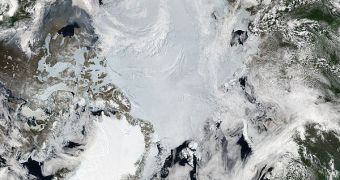A new study conducted in the Arctic highlights the extreme warming currently affecting the areas immediately around the North Pole. Researchers in the United States focused their investigation on studying ancient samples of Polytrichum mosses.
Large amounts of this type of moss are trapped inside Arctic ices, but they are currently being exposed by accelerated warming in the area. Both air and water temperatures around the North Pole are increasing faster than they have ever done, researchers announce.
According to the conclusions of the new paper, it would appear that Polytrichum mosses have not been exposed to the atmosphere in the Arctic in more than 44,000 years, suggesting that the current period is the first time in many millennia when sufficient melting occurs to reach the deep layers of ice where the mosses are entombed.
This estimation is based on the fact that these mosses rapidly degrade when exposed to the atmosphere, which implies that this is the first time since they have frozen that they are exposed. The research effort was carried out on Baffin Island, in the Canadian high Arctic, PhysOrg reports.
Details of the study appear in a recent issue of the esteemed scientific journal Geophysical Research Letters. The work was authored by University of Colorado in Boulder experts Gifford H. Miller1,2,*, Scott J. Lehman, Prescott College expert Kurt A. Refsnider, John R. Southon from the University of California in Irvine, and Yafang Zhong from the University of Wisconsin-Madison.
The researchers used carbon dating technologies to establish the age of the exposed moss samples. The data revealed that current temperature levels are the highest to hit the Arctic in around 44,000 years. A total of 365 moss samples were analyzed, and 145 viable measurements obtained as a result.
The most important implication for this study is that modern Arctic warming is far outside any type of natural variability that may affect the area. Climate skeptics have long since used natural variability as an attempt to explain Arctic warming, but this study – and others – proves them wrong.
“The great time these plants have been entombed in ice, and their current exposure, is the first direct evidence that present summer warmth in the Eastern Canadian Arctic now exceeds the peak warmth there in the Early Holocene era,” Miller explains.
“Our findings add additional evidence to the growing consensus that anthropogenic emissions of greenhouse gases have now resulted in unprecedented recent summer warmth that is well outside the range of that attributable to natural climate variability,” he concludes.

 14 DAY TRIAL //
14 DAY TRIAL //